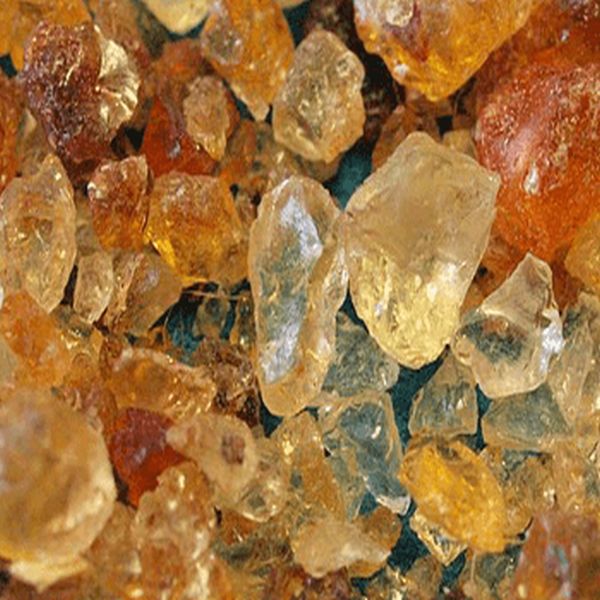Gum arabic, also sometimes called acacia gum or acacia powder, is a fibrous product made from the natural hardened sap of two types of wild Acacia trees. Around the world, gum arabic goes by many names, including acacia gum, arabic gum, acacia powder, Senegal gum, Indian gum and others.
Acacia senegal (L.), a tree in the Leguminosae (Fabaceae) plant family, is most commonly used to make gum arabic products. Vachellia (Acacia) is another species that produces a dried gum from its trunk and branches. These trees grow most abundantly in Sudan, where about 50 percent of the world’s gum arabic is now produced, but are also found in other parts of Africa, such as Kenya, Mali, Niger, Nigeria and Senegal.
What’s interesting about acacia trees is that they produce the most gum arabic when they experience “adverse conditions,” such as poor soil, drought or high heat. This actually damages the trees to some degree but causes an increase in the production of arabic gum.
What type of organic molecule is gum arabic? It is made of a mixture of glycoproteins, a class of proteins that have carbohydrate groups attached to the polypeptide chain, and polysaccharides, a carbohydrate whose molecules consist of a number of sugar molecules bonded together. It also includes oligosaccharides, another type of carbohydrate. Additionally, gums collected from acacia trees are a source of natural sugar compounds called arabinose and ribose, which were some of the first concentrated sugars to be derived from plants/trees. The exact chemical composition of gum arabic varies from product to product, depending on its source and the climate/soil conditions in which it was grown.
Today, there are many industrial and food-related uses for gum arabic. For example, gelatin, modified starch, gum arabic and pectin are the main types of gums used in many sugary/confectionery products. Arabic gum is used to help stabilize products including:
1.A wide variety of desserts and baking ingredients
2.airy products like ice cream
3.Syrups
4.Hard and soft candies
5.Ink, paint, watercolors, and photography and printing materials
6.Ceramics and clay
7.Stamps and envelopes
8.Shoe polish
9.Cosmetics
10.Firworks
11.Herbal medicines, pills and lozenges
12.Emulsions that are applied to the skin
Benefits of Arabic Gum could use for many part of body. Arabic gum as soluble fiber may contributes benefits to human health. Below are the list of benefits that you can get from Arabic gum :
1. Promotes good digestion
The first health Benefits of Arabic Gum is for promotes good digestion. Arabic gum contains high amount of soluble fiber which can help digestion tract function and ease the bowel movement. A study also reported that the fiber in Arabic gum can increase intestinal absorption.
2. Alleviate constipation
Constipation is a condition which cause by unhealthy bowel movement. As mentioned before that Arabic gum promotes good digestion, it may also help to alleviate constipation by improving bowel movement.
3. Strengthen Immune system
Fiber contained in Arabic gum is consider as pro biotic. It is a substance which can promotes the growth of good bacteria or normal flora inside the gut. The good bacteria or normal flora will later fight and suppress the growth of pathogen bacteria. This may help immune system to work better.
4. Control blood sugar
Studies reported that fiber has important role in the management of blood glucose. As part of food, fiber is not digested and it doesn’t require insulin to break it down. This may explain why eating a lot of fiber will not increase your blood sugar level.
5. Lowering cholesterol lever
Fiber in Arabic gum is effective in lowering cholesterol level. The soluble fiber will attach and bind the cholesterol so it wont be absorbed by intestine. Later the cholesterol will be brought out of the body through excretion system.
6. Get rid of sore throat
Arabic gum is one ingredients which is present in cough syrup and lozenges. Arabic gum contains component which can relieve irritation especially in the mucosa layer of respiration tract especially in mouth and throat.
7. Keep healthy teeth
Have you heard that chewing gum can help you to maintain healthy teeth? Yes, it is not a hoax. Arabic gum contains some amount of anti-bacteria which can prevent the growth of bacteria in mouth that may cause gum bleeding and tooth decay.
8. Help in weight loss
Fiber is popular in weight loss management. It can make you feel full for longer time and prevent you to eat more by adding bulk to your stomach. Fiber also blocking fat absorption and it is a good news that Arabic gum provide this benefits.
Post time: Mar-27-2020
